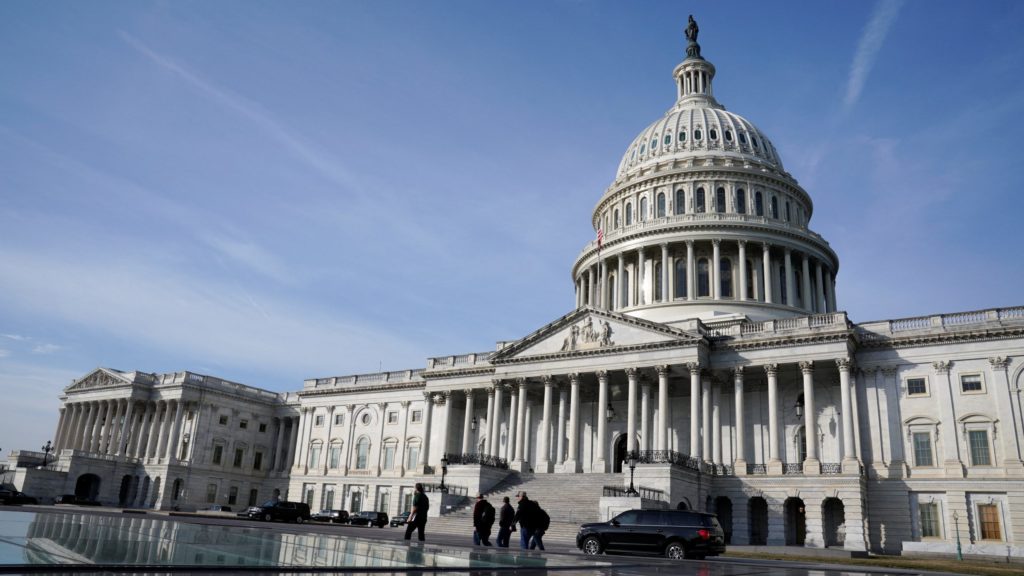The U.S. bishops' pro-life committee chairman said he is "grateful" a proposed constitutional amendment -- one that could have expanded abortion while reducing religious freedom -- has failed to move forward.
On April 27, the U.S. Senate declined to advance a resolution asserting the Equal Rights Amendment (ERA) has been ratified as a new amendment to the U.S. Constitution.
Originally written in 1923 by members of the National Woman's Party, the text of the ERA -- a follow-up to the 19th Amendment, which granted women the right to vote -- states that "equality of rights under the law shall not be denied or abridged by the United States or by any State on account of sex."
Efforts to ratify the amendment languished throughout the 20th century, even as women increasingly secured greater protections in the workplace and civil society.
The proposed amendment stood to "create a sweeping new nationwide right to abortion at any stage, at taxpayer expense, and (to) eliminate even modest protections for women's health and the lives of preborn children," said Bishop Michael F. Burbidge of Arlington, Virginia, chairman of the U.S. Conference of Catholic Bishops' (USCCB) Committee on Pro-Life Activities, in an April 28 statement.
With the end of Roe v. Wade, some abortion advocates have looked to the ERA "precisely because of its ability to overturn abortion laws throughout the country," said Bishop Burbidge, joined by other USCCB committee chairmen, in a Feb. 27 letter and background document to Congress voicing strong opposition to the now-failed resolution.
Also signing the letter were Cardinal Timothy M. Dolan of New York, chairman of the Committee for Religious Liberty; Archbishop Borys Gudziak of the Ukrainian Catholic Archeparchy of Philadelphia, chairman of the Committee on Domestic Justice and Human Development; and Bishop Robert E. Barron of Winona-Rochester, Minnesota, chairman of the Committee for Laity, Marriage, Family Life, and Youth.
The ERA would likely have required federal funding of abortions, while restraining federal and state regulations of abortion, "such as third-trimester or partial birth abortion bans, parental consent, informed consent, conscience-related exemptions, and other provisions," wrote the bishops.
Conscience protections for churches and other faith-based organizations also would be placed at risk, said the bishops, "whenever there is a claimed conflict with the sexual nondiscrimination norms that the ERA would adopt."
In such a scenario, said the bishops, "the unanimous 2021 Supreme Court decision in Fulton v. City of Philadelphia, protecting faith-based foster care agencies' ability to honor children's right to a mother and a father, could come out very differently."
The ERA could "make it more difficult for faith-based organizations to compete on a level playing field with secular organizations in qualifying for public resources to provide needed social services," they wrote.
Regarding gender and related concerns, the ERA could result in "a radical restructuring of settled societal expectations with respect to sexual difference and privacy," where "sex separation could be scrutinized on the same level as racial segregation," the bishops said.
Since it only applies to sex discrimination by the government, not the private sector, the ERA "may not be helpful on issues like unequal pay or sexual harassment in the workplace ... or violence against women," and could even "prohibit government policies" beneficial to women, said the bishops.
"Apart from the concerns over its effects, there is also a strong argument that the current amendment, as purported to have been ratified by a number of states, is 'dead' and may not be revived by a simple majority in Congress," the bishops said.
In addition, "discrimination against women is already prohibited by a multitude of federal and state laws," and is "covered by the Constitution's Equal Protection Clause under precedent that was developed after the ERA was submitted to the states," they noted.
The bishops also stressed their longstanding commitment to "the equality of men and women," about which "Catholic teaching speaks very clearly and strongly."
Their own "explicit concern for just wages and the fair treatment of women goes back at least 100 years," the bishops said.
Four years before the ERA was drafted, a Feb. 12, 1919, statement on the "Bishops' Program of Social Reconstruction" declared that "women who are engaged at the same tasks as men should receive equal pay for equal amounts and qualities of work."

